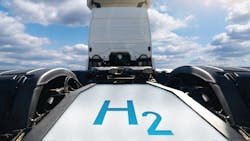There have been a lot of developments in the area of hydrogen as an energy source for zero-emission long-haul trucking. So many developments were occurring that NACFE put together a team to study it and recently published a Guidance Report, "Hydrogen Trucks: Long-Haul’s Future"?
The report was actually a follow-up to a report we had completed in 2020, “Making Sense of Heavy-Duty Hydrogen Fuel Cell Tractors”. With the new report, we found that we got a lot of things right, but we missed the option of hydrogen internal combustion engines which are garnering attention by some in the trucking industry.
See also: NACFE report affirms hydrogen's major role in long-haul trucking's future
NACFE has been clear that at this stage in their development battery-electric vehicles (BEVs) are not right for every application and use case. However, there are many applications where BEVs make perfect sense including vans and step vans, medium-duty box trucks, terminal tractors, and heavy-duty tractors in short regional haul.
We also know that the journey to zero-emission is not going to be easy and that there are still obstacles that need to be overcome including charging infrastructure development, increasing battery range, and decreasing battery weight to name a few.
I have heard some people say that the move to BEVs is too hard, so they are going to move to hydrogen fuel cells. Hydrogen fuel cells or hydrogen in internal combustion engines have their challenges as well.
However, regardless of the challenges the trucking industry needs to keep moving along the path toward zero-emissions freight movement whether that is with BEVs, hydrogen fuel cells, hydrogen internal combustion engines, or power from compressed natural gas, renewable diesel, or a host of other options.
Getting back to the recent guidance report on hydrogen for long-haul trucking, I wanted to share some key conclusions with you, and I encourage you to read the report—or at least the executive summary—to discover some of the key findings as well.
The study team concluded that hydrogen is a complex topic and that its use in freight transportation is in its infancy. Here are or four significant conclusions.
- Hydrogen and battery electric are not an “either/or” but an “and” for the zero-emission freight future.
- Hydrogen fuel cell tractors are the only zero-emission solution for many duty cycles for heavy duty tractors.
- Alternative fuels like RNG, renewable diesel, and hydrogen used in internal combustion engines will be required to support the transition in the next two decades to help make progress towards zero-emission goals, while in parallel ramping up the hydrogen and battery electric infrastructure and manufacturing base.
- Industry agreement is needed on whether hydrogen long-haul fuel cell tractors and the transport of the hydrogen fuel itself, will be based on gaseous or liquid hydrogen.
Michael Roeth has worked in the commercial vehicle industry for nearly 30 years, most recently as executive director of the North American Council for Freight Efficiency(NACFE). He serves on the second National Academy of Sciences Committee on Technologies and Approaches for Reducing the Fuel Consumption of Medium and Heavy-Duty Vehicles and has held various positions in engineering, quality, sales, and plant management with Navistar and Behr/Cummins.
About the Author

Michael Roeth
Executive Director
Michael Roeth is the executive director of the North American Council for Freight Efficiency. He serves on the second National Academy of Sciences Committee on Technologies and Approaches for Reducing the Fuel Consumption of Medium and Heavy-Duty Vehicles and has held various positions with Navistar and Behr/Cummins.
